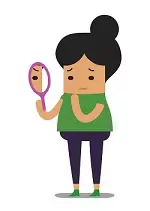
Gender and sexuality
Doubts and feelings
It's normal to have questions about your gender or sexuality. You might not be sure who you are yet, or you may not feel comfortable with the gender you were born with. Many young people feel this way.
Sometimes these feelings can lead to problems, such as feeling low, anxious, or unsure about yourself. It’s important to know: you are not alone.
Do you feel different from the gender you were assigned at birth? Are you looking for mental health support or thinking about changing your gender? Then make an appointment with your GP. They can refer you to specialist care.
Healthcare in the NetherlandsWhat can you do?
- Take your time. You don't have to know exactly who you are right away. Discover it step by step
- Talk about it. Write down how you feel, or talk to someone you trust. That can help you feel better
- Find support. Would you rather talk to someone outside your own circle? Or are you looking for information or contact with others? Then check the websites and organisations listed at the bottom of this page
What are gender and sexuality?
Gender is about qualities that people often call masculine or feminine. But gender is more than that. It’s also about how you feel inside and which gender fits you best — this is called your gender identity.
Sexuality is about who you feel attracted to. This can be about love, romance and/or sex. Everyone experiences sexuality in their own way. You might feel attracted to people of the same gender, a different gender, more than one gender, or to no one at all.
There are many words and terms related to gender and sexuality. These terms can mean different things to different people, and their meanings can change over time. Below, you can find explanations of some common terms.

Important terms
This is how you see yourself. Do you feel like a man, a woman, both, neither, or something in between? That is your gender identity.
- Cisgender: you feel the same as the gender you were born with
- Transgender: you feel different from the gender you were born with
- Non-binary / genderqueer / gender-fluid: you don't feel like a man or a woman, but something else or a mix
This is about who you feel sexually or romantically attracted to.
- Heterosexual (straight): you are attracted to people of the opposite gender
- Homosexual (gay or lesbian): you are attracted to people of the same gender
- Bisexual: you are attracted to more than one gender
- Pansexual: you are attracted to people, no matter their gender
- Asexual: you feel little or no sexual attraction
Do you have any comments about the terms or the explanations? Please reach out to: studentcommunicatie@fontys.nl.
There is a lot of information about gender and sexuality these days, but not everything is clear or reliable. Check the links at the bottom of this page for trusted sources. Reading stories from others can also help you understand yourself better. Many people share their experiences online. By talking, reading, and exploring what feels right for you, you can learn more about who you are.
Self-learning modules
At Fontys, there are online self-help modules that can support you if you’re not feeling well.
They cover topics like dealing with anxiety, building self-esteem, or living according to your values.
These modules are not made especially for questions about gender or sexuality, but they can still help if you feel stress, insecurity or other emotions because of these topics.
If your problems don’t get better (or get worse), always ask for professional help. You can contact your GP or a student psychologist (check Contact).
Anxiety
If you often feel anxious or have panic attacks, you’re not alone. This self-help module can help you understand and manage your anxiety, so it doesn’t get worse.
Go to the Anxiety and panic module
Self-image
If you often doubt yourself or feel not good enough, this module can help. You'll learn to understand your self-image and become kinder to yourself.
Go to the Self-image module
Resilience
Want to build more resilience? This module helps you understand how you react to setbacks and teaches you how to deal with them better in the future.
Go to the Resilience module
Useful links
Contact
Book your appointment with a student psychologist or a student counsellor.
Book an appointmentWho can you contact?
- You can contact a student psychologist if you are experiencing complaints, worries, or problems for which you don’t immediately see a solution. They offer short‑term therapy.
- If your mental well‑being is affecting your study progress, if you want to request special arrangements, or if you are struggling with motivation issues, then you should make an appointment with a student counsellor.
